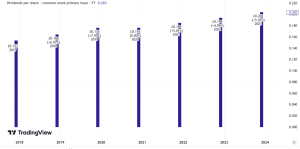With the release of its full-year results today (27 November), easyJet (LSE: EZJ) looks like a business that is flying high. Headline pre-tax profit rose to £610m and the proposed final dividend is well over double what it was last year. But the easyjet share price is still just 49% of what it was five years ago.
Why is the share languishing – and ought I to add it to my portfolio?
Good performance but still showing damage
To understand that, it is helpful to compare the latest results to those from five years ago, before the airline was put on the ropes by pandemic-era travel restrictions.
Back then, revenue was £6.4bn. Last year it was £5.7bn, which is still a considerable distance away from the 2019 level.
Last year’s headline profit before tax of £610m was comfortably ahead of the £427m achieved back in 2019. Growing that number 43% even on lower sales revenues is impressive in my view and reflects the company’s pricing power due to high customer demand, a proven business model and strong brand. Cost cuts in recent years may also be a lasting financial benefit of a difficult time.
But that difficult period saw easyJet boost its balance sheet by issuing new shares. So, although total headline profits last year were higher than in 2019, headline basic earnings per share were 31% lower than they had been back then.
Valuing airlines can be a tricky thing to do
Here is why that matters from an investing perspective.
Although the profitability picture last year was strong, the greater number of shares means that each share represents a smaller slice of earnings than five years ago. A common way to value shares is the price-to-earnings ratio. Lower earnings per share can therefore help explain a lower share price.
Still, the percentage fall in the easyJet share price in the past five years is markedly bigger than the decline in headline basic earnings per share. Could that represent a bargain?
Maybe – but maybe not.
For a start, the 2019 share price may have been an unreasonable one. For example, I think it did not fully factor in the risk of a pandemic decimating air travel demand. After all, the share fell 65% between November 2019 and the following April.
Airlines can be hard to value accurately. Profitability can be suddenly impacted by factors outside their control, from fuel costs fluctuating to sudden demand shocks like the pandemic.
So while the company has been performing well and I think the current share price looks reasonable given the airline’s likely outlook, I reckon I can find attractively valued companies with more control over key risks to their business. I therefore have no plans to buy easyJet shares for my portfolio.
This post was originally published on Motley Fool







